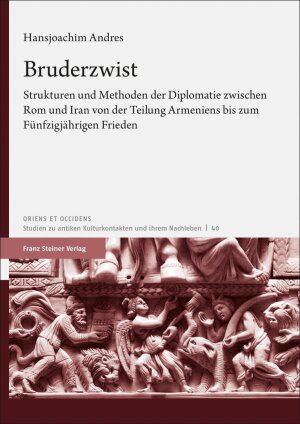Dr. Hansjoachim Andres
Contact
Hansjoachim Andres
Image: Anne Günther (University of Jena)E-Mail: hansjoachim.andres@uni-jena.de
-
Vita
30. Juni 1993
geboren in Rudolstadt
2011
Abitur am Orlatal-Gymnasium in Neustadt an der Orla
2011-2014
Bachelor-Studium der Geschichte und Germanistik an der Friedrich-Schiller-Universität Jena
2012-2015
Tutor in der Alten Geschichte
2013-2016
Studentische Hilfskraft in der Alten Geschichte
Februar 2014
Aufnahme in die Studienstiftung des deutschen Volkes
2014-2016
Master-Studium "Geschichte der Antike" an der Friedrich-Schiller-Universität Jena
2017-2020
Förderung der Dissertation "Politische Strategien und Diplomatie in den Konflikten zwischen dem spätantiken Rom und den Sasaniden im 5. und 6. Jahrhundert" durch die Studienstiftung des deutschen Volkes
WiSe 2017/18 & SoSe 2020
Lehrbeauftragter am Lehrstuhl für Alte Geschichte der Friedrich-Schiller-Universität Jena
2020-2022
Wissenschaftlicher Mitarbeiter am Lehrstuhl für Alte Geschichte, Heinrich Heine Universität Düsseldorf
2023
Mitarbeiter im Stadtarchiv der Stadt Neustadt an der Orla
WiSe 2023/24
Lehrbeauftragter am Lehrstuhl für Alte Geschichte der Friedrich-Schiller-Universität Jena
-
Publications
Monographs
- Bruderzwist. Strukturen und Methoden der Diplomatie zwischen Rom und Iran von der Teilung Armeniens bis zum Fünfzigjährigen Frieden, Stuttgart 2022.
Papers
- Der καιρός bei Prokop von Kaisareia, Millennium 14, 2017, 73-102.
- Die Bestrafung der Misimianen, in: Schleicher, Frank / Stickler, Timo / Hartmann, Udo (Hrsg.), Iberien zwischen Rom und Iran. Beiträge zur Geschichte und Kultur Transkaukasiens in der Antike, Stuttgart 2019, 129-152.
- Olympiodor von Theben und die literarische Tradition der Zerstörung apotropäischer Statuen, in: Stickler, Timo / Roberto, Umberto (Hrsg.), Das Weströmische Reich und seine Erforschung. Neue Perspektiven, Stuttgart 2024, 224–259.
Editorship
- Praeparatio Evangelica. Schriften des Christlichen Gymnasiums Jena, herausgegeben von Hansjoachim Andres und Johannes Deja.
Reviews
- RezensionExternal link zu Behrwald, Ralf / Witschel, Christian (Hrsg.), Rom in der Spätantike. Historische Erinnerung im städtischen Raum, Stuttgart 2012, H-Soz-Kult, 06.06.2017.
- RezensionExternal link zu Lillington-Martin, Christopher / Turquois, Elodie (Hrsg.), Procopius of Caesarea. Literary and Historical Interpretations, Abingdon 2017, H-Soz-Kult, 22.01.2018.
- Rezension zu Brodka, Dariusz, Prokop von Caesarea, Hildesheim / Zürich / New York 2022, in: Plekos 25, 2023, 635–645.
Conference Reports
- TagungsberichtExternal link: Das Weströmische Reich und seine Erforschung – neue Perspektiven, 04.06.2021 – 06.06.2021 (digital) Jena, H-Soz-Kult, 28.06.2021.
- TagungsberichExternal linkt: Imperia sine fine? Der römisch-parthische Grenzraum als Konflikt- und Kontaktzone, 18.09.2019 – 20.09.2019 Jena, H-Soz-Kult, 02.10.2019.
- TagungsberichtExternal link: Iberien zwischen Rom und Iran von Pompeius bis Herakleios, 07.07.2016 Jena, H-Soz-Kult, 08.08.2016.
Fiction
- Gedichte, Verserzählungen und Balladen. Band 1, Norderstedt 2011.
- Kolumbus. Versdrama in fünf Akten, Norderstedt 2011.
- Helenos und Helena. Fabel in Versen aus einem trojanischen Krieg, Norderstedt 2017.
Projects
-
Political Strategies and Diplomacy in the Conflicts between Late Antique Rome and the Sasanians during the 5th and 6th centuries
Buchcover: Bruderzwist
Image: Franz Steiner VerlagBoth diplomacy and its academic study have changed considerably since the First World War. In political science, a "new diplomacy" is assumed, in which the conventional history of diplomacy, which is limited to intergovernmental negotiations at the highest level, is replaced by a broader view that includes numerous aspects and matters of international relations.
However, this does not apply to the same extent to classical studies. The narrow 19th century understanding of diplomacy and the basic assumptions associated with it about diplomacy as an essentially honest and honourable meeting of state powers at eye level within a strict formal framework still prevail. As a result, a large proportion of interstate actions, which today are unquestionably categorised as diplomacy, have remained unnoticed in this context.
The dissertation demonstrates a continuous and uninterrupted tie of relations between Rome and the Sasanians, which leads to a reassessment of the military and civil conflicts found in the sources. In the light of the concept of "new diplomacy", the impression of short-term and almost arbitrary foreign policy gives way to this tie, which both sides sought to modify in their favour using all the means available to pre-modern polities.
Publication:
Andres, Hansjoachim, Bruderzwist. Strukturen und Methoden der Diplomatie zwischen Rom und Iran von der Teilung Armeniens bis zum Fünfzigjährigen Frieden, Stuttgart 2022

